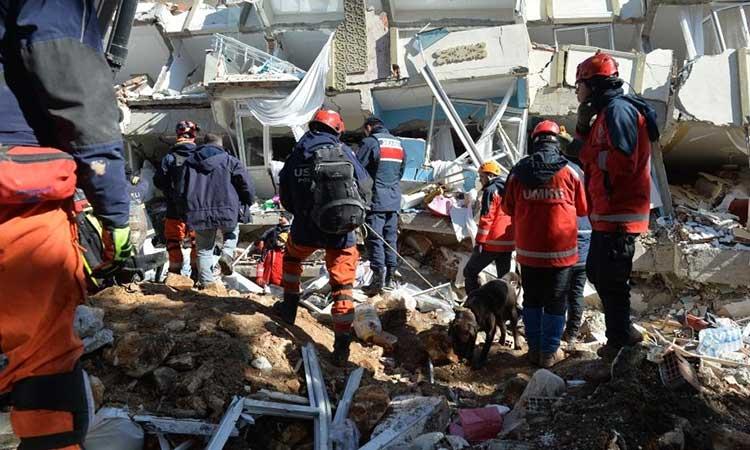As search and rescue efforts continued for a sixth straight day on Saturday to find more survivors, the number of people killed following the devastating earthquakes that struck Turkey and Syria on February 6 has reached at least 23,831, according to authorities.
In its latest update, Turkey's Disaster and Emergency Management Authority (AFAD) said the overall death toll currently stood at 20,318, with 80,052 reported injuries, Anadolu News Agency reported.
The 7.7- and 7.6-magnitude earthquakes, centred in the Kahramanmaras province, affected more than 13 million people across the provinces of Adana, Adiyaman, Diyarbakir, Gaziantep, Hatay, Kilis, Malatya, Osmaniye and Sanliurfa.
Also read |White House communications director to step down
In Syria, the total number of those killed stands at 3,513, CNN reported.
According to volunteer organisation Syria Civil Defense, also known as the White Helmets, 2,166 deaths were registered in rebel-held areas in the northwest of the country.
Meanwhile, the Syrian state media has said that 1,347 fatalities were reported in government-controlled parts of the war-torn nation.
The delivery of urgent supplies to quake-hit rebel-held areas in northern and northwestern Syria has been complicated by a long-running civil war between opposition groups and the Syrian government.
On Friday, Turkish President Recep Tayyip Erdogan acknowledged that his government's response to the massive disaster was not as fast as desired, reports Xinhua news agency.
Also read | Omicron subvariant XBB.1.5 prevalence jumps to 75% in US
"Too many buildings were damaged, unfortunately. We were not able to speed up our interventions as quickly as we had desired," he told reporters in the quake-affected Adiyaman province.
The emergency work was "very difficult" as the devastating effect of the earthquake spread over an area of 500 km, he said, adding that the harsh winter has been another obstacle.
"Most of the public workers, who would have conducted the first intervention and organizations, were themselves under the collapsed buildings," the President added.
Erdogan had earlier admitted that the government had shortcomings in responding to disaster on the first day, but then had better managed the situation.
But now the country has gathered "perhaps the world's largest search and rescue teams" with more than 141,000 staff, including foreign emergency teams, he said.
The President has pledged to rebuild the quake-hit region within one year and provide one-year rental assistance for victims of the earthquake if they do not want to live in tents.
Erdogan's government has faced criticism from the quake victims that the emergency response was late and humanitarian aid was not sufficient in the earthquake zone of 10 provinces, which are home to nearly 13.5 million people.
The Turkish parliament on Thursday passed a state of emergency decision in 10 provinces impacted by the earthquake for three months upon the request of the President.
Meanwhile, over 81,000 people have been evacuated from the quake hit regions, according to AFAD.
Rescuers, relatives and local citizens burst into tears of joy after an eight-year-old boy was saved from the ruins of a building at Antakya, a district of Hatay province, 108 hours after the quake.
In the town of Iskenderun, a family of six was extracted from the rubble after 102 hours.
Raziye and Haci Murat Kilinc, two neighbours of the family, were rescued after 107 hours.
Many countries and global aid agencies have voiced support for the two countries, and some of them have sent rescue teams and relief supplies to quake-hit regions.
The devastating 7.8 tremor struck Turkey's southern province of Kahramanmaras at 4.17 a.m. on February 6, which was followed by a 6.4-magnitude temblor a few minutes later in Gaziantep province.
The epicentre of the 7.8-magnitude quake was 23 km east of Nurdagi in Gaziantep, at a depth of 24.1 km.
At around 1.30 p.m, a third 7.5-magnitude tremor hit Kahramanmaras.


















